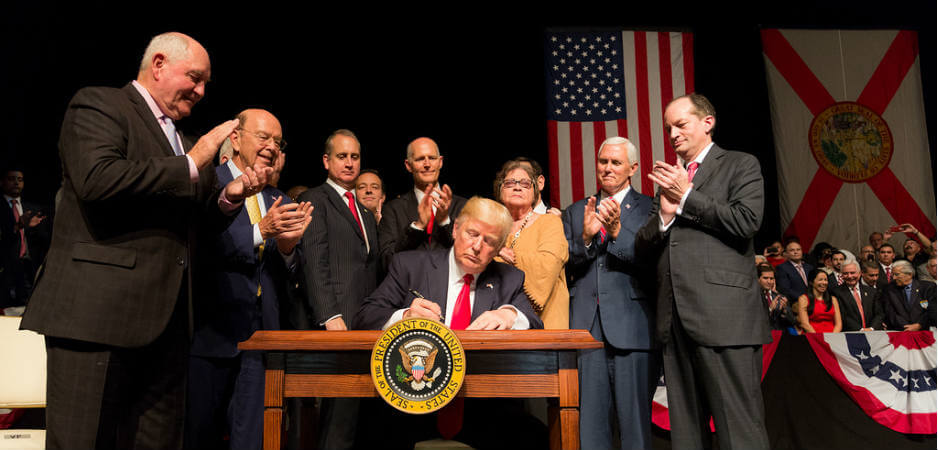The US government is not a cult or a totalitarian regime.
As we watch the government put our president through a very public inquiry into the nature of his connections with Russia and his possible obstruction of justice, we can, hopefully, finally, put to rest the nonsensical notion that our government is being run by a totalitarian regime.
Since the day Donald J. Trump announced his candidacy for president, some experts on cults and totalitarian regimes have repeatedly (and I mean repeatedly) warned everyone around them that he is a cult leader and a tyrant and that his rise to power is reminiscent of Adolf Hitler’s.
Renowned totalitarianism expert Robert Jay Lifton has warned: “Military powers entrusted to [President Trump] endanger us all.” Steven Hassan, founder of the Freedom of Mind Resource Center, agreed that “Trump shares important characteristics with your average cult leader” and that there was “a real danger of his campaign becoming a full-blown political cult,” and has continued regularly to use his Freedom of Mind website and his public Facebook posts to raise awareness about the president’s cultic and tyrannical ways. Even British social psychologist Alexandra Stein has cautioned: “There are too many warning signs to ignore. I’d call it totalitarianism. … Be scared!” She devotes a great deal of energy and much of her class on cults and totalitarian regimes (which I attended) to the subject of why President Trump is a tyrant and why we should all “be scared!”
That the president of the United States is not, and cannot possibly be, a tyrant is obvious to any objective observer with a middle-school understanding of the US government. Our government has three branches, not one, and each can override another’s demands. A response to British monarchical rule, the US government is a tyrant-proof system. Thus, calling the president of the United States a cult leader or a tyrant is as incoherent as the idea of kosher pork.
Dissent in the Ranks
But even if we ignore what we Americans learned in elementary school and it were somehow possible for a US president to run the country as a tyrant, we do not see the typical signs of a cult leader or tyrant in Donald J. Trump. Quite the contrary: Cult leaders appoint to their inner circle loyal followers who will not contradict them. President Trump, however, appointed to his cabinet some of his most outspoken opponents, such as Governors Nikki Haley and Rick Perry, and almost appointed another one in Mitt Romney.
Ambassador Haley has since publicly contradicted the president several times, and, unlike a tyrant, President Trump has not disposed of her for doing so. The president’s Supreme Court nominee, Neil Gorsuch, openly criticized Trump for questioning the legitimacy of the court’s decision on the temporary travel ban, and the president did not withdraw his support for Gorsuch’s nomination.
When the president appointed H.R. McMaster as his national security advisor, The New York Times reported that “General McMaster is considered one of the military’s most independent-minded officers,” that he “had the aura of disruption that Mr. Trump has valued in several cabinet secretaries, said a senior administration official,” and McMaster had “made a name for himself as a young officer with a searing critique of the Joint Chiefs of Staff for their performance during the Vietnam War and later criticized the way President George W. Bush’s administration went to war in Iraq.” Independent-minded officer? An aura of disruption? Not exactly what any good tyrant would want in his inner circle.
While tyrannical regimes and cults maintain tight limits and filters on the amount and types of information disseminated to anyone outside the inner circle, Jeff Mason, president of the White House Correspondents’ Association, acknowledged in an otherwise critical speech at the association’s dinner in April: “Press access under President Trump has been very good. … We have had several press conferences [by the President], repeated opportunities to see and report on the President’s meetings, and, with at least one notable and lamentable exception, good access to briefings with press staff and senior administration officials.”
Finally, the president’s repeated failures in having his “decrees” obeyed demonstrate just how absurd the tyrant notion is. One of the president’s first executive orders, the temporary travel ban, has been struck down at least three times. His attempt to cut off funding for sanctuary cities also has been shot down by a court. His first attempt at a health care plan was vetoed by his own party. Shortly after he pulled out of the Paris Agreement, Hawaii defied the president by adopting the terms of the agreement. So how’s the tyrant thing working out?
A Cult, You Say?
We also do not see the signs of cultic behavior on the part of President Trump’s followers. Unlike in cults, we do not generally find an elitist mentality among Trump supporters, as if they are “better” than Hillary Clinton supporters. On the contrary, it is from many on the far left from whom we have heard elitist boasts such as Trump supporters being uneducated and a bunch of unenlightened racists — unlike us, the progressive and enlightened.
While cult members often shun and isolate themselves from the outside group, we do not generally find an us versus them mentality among Trump supporters versus those who do not support Trump. On the contrary, a survey found that liberals were 3.5 times more likely to have unfriended someone on social media shortly after the election than conservatives were, and by all accounts this trend has only continued.
Unlike in cults, average Trump supporters do not see their leader as infallible. Upon the revelation Trump had bragged about grabbing women by the private parts, even his staunchest supporters, indeed even his own running mate, openly criticized Trump for this behavior. Many Trump supporters already have openly criticized one or more of his acts since taking office, whether it be his initial handling of the travel ban, his waffling on having Mexico pay for the wall or the delay in its construction, his about face on moving the US embassy from Tel Aviv to Jerusalem, his firing of FBI Director James Comey, and so on.
Our government did not transform into a totalitarian regime over the last eight years, despite many examples of control and persuasion from the top that some may judge as cult-like. The Obama administration subpoenaed the phone records of 20 Associated Press journalists and tracked a Fox News reporter’s visits to the US State Department, his phone calls and his personal emails; threatened to exclude Fox News from press briefings until Fox News’s competitors spoke up and said, “enough;” was called out by the editorial board of The New York Times as having “moved beyond protecting government secrets to threatening fundamental freedoms of the press to gather news;” was described by his CIA director and later Department of Defense head Leon Panetta as “limiting decision-making to his inner circle;” was arguably our most persuasive and charismatic president since President John F. Kennedy; and enjoyed a level of unquestioning devotion among many of his supporters, many of whom saw him as infallible or even messianic, that would make the most successful cult leader jealous.
And yet even President Obama was incapable of getting the country to run strictly according to his wishes over the last eight years, as a tyrant would. There would therefore seem to be no concern that a president with a 58% disapproval rating will have better success even if he tried to become our first ever tyrant.
Perhaps the International Cultic Studies Association (ICSA) needs to adopt a Trump Rule, the way the American Psychiatric Association instituted the Goldwater Rule, which instructs its members that “it is unethical to offer a professional opinion about an individual without conducting an examination,” as this fear-mongering on the part of these far-left cult experts does nothing but create fear.
Even if it were possible for a US president to lead as a dictator, and even if President Trump fit the job description of a dictator, the election is over. Donald Trump is the 45th US president. So what do these cult experts accomplish by telling everyone, at every opportunity, that Trump is a dictator? By abusing their authority in this way and telling everyone who will listen that “Trump is a tyrant,” “Trump is like Hitler,” “Trump is a dictator,” “Be afraid!” it would seem the only thing these cult experts are accomplishing is, in fact, making people afraid.
The US alone is home to up to 10,000 cults, according to Steve Eichel, the president of the ICSA. And so all the time and effort cult experts expend on raising awareness and creating fear about a cult that does not exist is time and effort not spent on raising awareness about and helping victims leave and recover from the many cults that do exist and attempting to alleviate the tremendous harm these very real cults inflict. We, therefore, respectfully urge these experts to get back to focusing their time and energy on this vital cause.
The views expressed in this article are the author’s own and do not necessarily reflect Fair Observer’s editorial policy.
Photo Credit: The White House
Support Fair Observer
We rely on your support for our independence, diversity and quality.
For more than 10 years, Fair Observer has been free, fair and independent. No billionaire owns us, no advertisers control us. We are a reader-supported nonprofit. Unlike many other publications, we keep our content free for readers regardless of where they live or whether they can afford to pay. We have no paywalls and no ads.
In the post-truth era of fake news, echo chambers and filter bubbles, we publish a plurality of perspectives from around the world. Anyone can publish with us, but everyone goes through a rigorous editorial process. So, you get fact-checked, well-reasoned content instead of noise.
We publish 2,500+ voices from 90+ countries. We also conduct education and training programs
on subjects ranging from digital media and journalism to writing and critical thinking. This
doesn’t come cheap. Servers, editors, trainers and web developers cost
money.
Please consider supporting us on a regular basis as a recurring donor or a
sustaining member.
Will you support FO’s journalism?
We rely on your support for our independence, diversity and quality.







